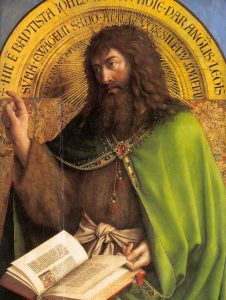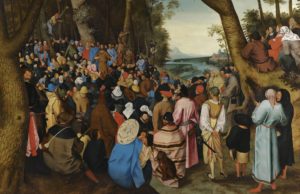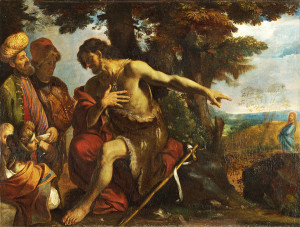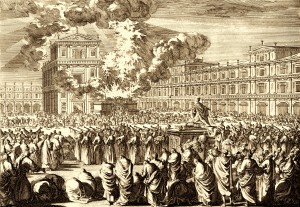Thoughts on Sunday’s Lessons for Dec. 5, 2021
First Reading: Baruch 5:1-9
In the second week of Advent, we turn from apocalyptic expectations of fear and foreboding to a more hopeful theme: A Messenger is coming to make the way ready for the Messiah.

Detail from the Ghent Altarpiece: St John the Baptist (c.1425-1429l). Oil painting on panel by Jan van Eyck (c.1390-1441). Saint Bavo Cathedral, Ghent, Belgium. (Click image to enlarge.)
In Sunday’s first reading from the prophet Baruch (one of the apocryphal books at the end of the Hebrew Bible) gives us his version of a more familiar Isaiah passage: He declares that Israel in exile will no longer need to mourn, for God will lower the mountains and fill up the valleys to make level ground upon which the people may walk safely home. In the Gospel, Luke will repeat the Isaiah verses in the voice of John the Baptist.
Or:
First Reading: Malachi 3:1-4
God’s Messenger is coming, and the people will delight in them, foretells the minor prophet Malachi, whose Hebrew name literally means “my messenger.” But it’s not going to be easy, Malachi warns the people. Because of their sins and their failure to walk in God’s way, the Messenger will have to cleanse the people with fire and strong soap, making them pure and pleasing to God. In words that Handel would make unforgettable in The Messiah two millennia later, the prophet sings, “Who can endure the day of his coming? He is like a refiner’s fire!”
Psalm: Canticle 16 (Luke 1: 68-79)
In place of a Psalm we sing a Canticle taken from Luke’s Gospel. These verses tell the story of John the Baptist’s father, Zechariah, a priest of the Temple. When Zechariah had refused to believe that his elderly wife, Elizabeth, had really become pregnant after an angelic visitation, God struck him mute. But his voice returned when he held the infant and named him John. This child, Zechariah declares, in words that we often read in Morning Prayer, is to be a prophet like Abraham, the Messenger who will “go before the Lord to prepare his way.”
Second Reading: Philippians 1:3-11
In affectionate words reminiscent of his letter to the Thessalonians in last week’s second reading, Paul starts his letter to the people of Philippi in Macedonia, Greece, with greetings, love, thanks for their friendship and prayers for their well-being. Writing from a Roman prison, Paul remembers their eager acceptance of the Gospel. He prays for this little congregation’s continued spiritual growth and insight, and he prays that this will lead them to a harvest of righteousness and justice in God’s love through Christ.
Gospel: Luke 3:1-6
In Sunday’s Gospel, Luke introduces us to John the Baptist, who we had met in the Canticle/Psalm as an infant in the hands of his father, the Temple priest Zechariah. The reading begins with a detailed roster of Roman and Jewish leaders of the time, a practice that we also see in the introduction of Hebrew Bible prophets like Ezekiel, placing the prophet in a specific time and place. Luke tells us that John, traveling in the regions along the Jordan, proclaimed a baptism of repentance for the forgiveness of sins. Then Luke likens John’s prophecy to Isaiah’s call to “Prepare the way of the Lord … make his paths straight,” filling every valley and making every mountain and hill low so that all humanity may see God’s salvation.



